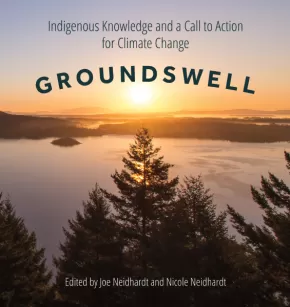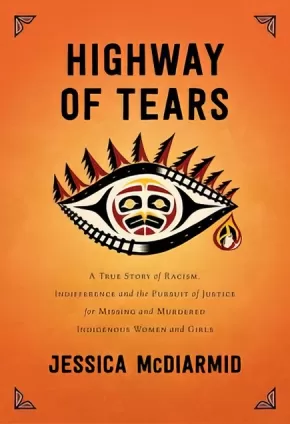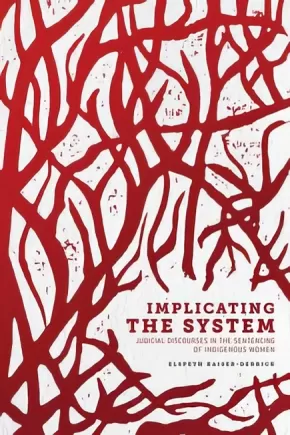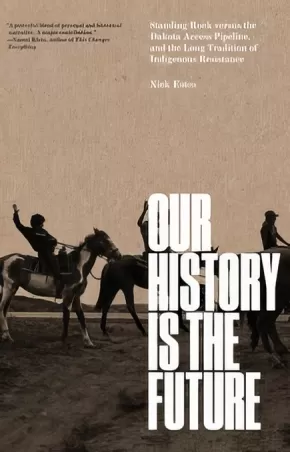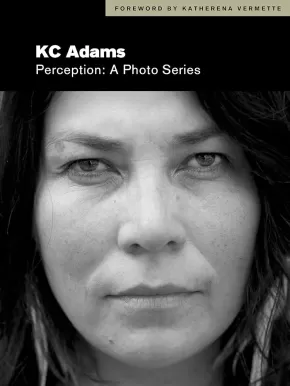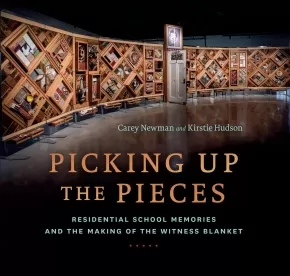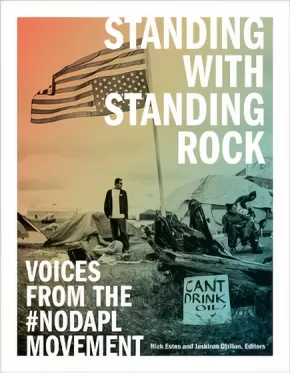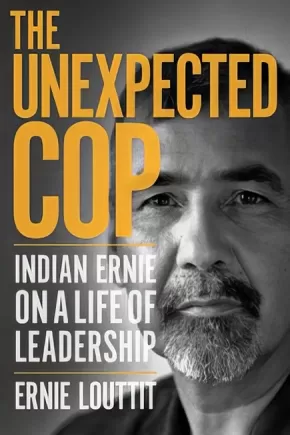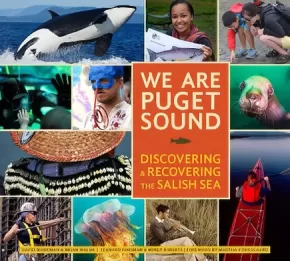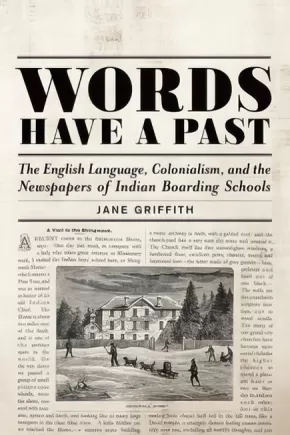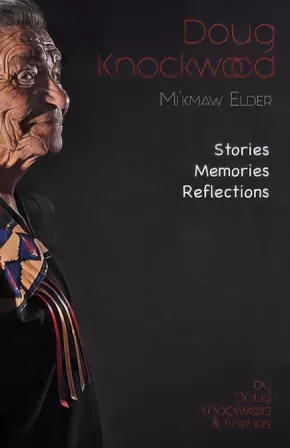
Social Responsibility
31
-
45
of
65 Results;
Sort By
Go To
of 5
Groundswell: Indigenous Knowledge and a Call to Action for Climate Change
$49.95
Artists:
Editors:
Format:
Hardcover
Text Content Territories:
Indigenous;
ISBN / Barcode: 9781771743440
Synopsis:
Synopsis:
Groundswell is a collection of stirring and passionate essays from both Indigenous and non-Indigenous writers that eloquently present a compelling message about how traditional Indigenous knowledge and practices can and must be used to address climate change. The chapters interconnect, taking us from radical thinking to the gentleness of breath, and demonstrate that we are all in this together—everyone must understand what needs to be accomplished and participate in the care of Mother Earth.
Authors tap into religious and spiritual perspectives, explore the wisdom of youth, and share the insights of a nature-based philosophy. These collective writings give you a chance to contemplate and formulate your own direction. A moral revolution that can produce a groundswell of momentum toward a diverse society based on human rights, Indigenous rights, and the rights of Mother Earth.
Beautifully illustrated with photographs, Groundswell is augmented with video recordings from the authors and a short documentary film, available on the project’s website. Profits from the book will help support the videos, documentary, and future projects of The Call to Action for Climate Change. Visit www.envisionthebigpicture.com.
Reviews
"A beautifully illustrated and highly engaging read.… Essays from both Indigenous and non-Indigenous contributors present a strong vision for how traditional knowledge can be used to fight climate change, as well as how we can work together toward a more balanced and harmonious relationship with nature." – Joan Elliott, librarian and Manager of Stewart Resources Centre
“This book shares Indigenous knowledge that can teach us to listen to and be in relationship to the Earth in a way that honours the sacredness and interdependence of all life forms. A paradigm shift, informed by Indigenous ways of knowing and acting, is crucial in this time of climate change.” – Laura Stivers, author of Disrupting Homelessness: Alternative Christian Approaches
“A powerful text that introduces a much-needed perspective on the issue of climate change.… When reading the chapter ‘Rooted: Staying Grounded Amidst a Changing Landscape’ by Nicole Neidhardt, Teka Everstz, and Gina Mowatt, I was moved by the presence of youth voices. As a young, Indigenous person myself, I felt a great power, understanding, and nuance to the voices emerging in the chapter.… Nicole Neidhardt, Teka Everstz, and Gina Mowatt asked for more than a challenge of the reader’s ideology—they screamed out for a call to action." – Forrest Goodluck, award-winning youth filmmaker who appears opposite Leonardo DiCaprio in The Revenant
“The reflections of three young Indigenous activists (‘Rooted: Staying Grounded Amidst a Changing Landscape’) … are sharp, buoyant reminders of elation and advocacy in a world of overwhelming and seemingly unlimited power: colonialism, imperialism, and industrial capitalism. These narratives bring me moral conviction and faith as we all walk hand-in-hand into our carbon wrought future.” – Kalen Goodluck, freelance documentary photographer and journalist
Educator Information
Recommended Resource for Grades 11-12 and College/University Students.
Social Studies/B.C. First Peoples/Comparative Cultures/Contemporary Indigenous Studies Curricular Concepts Explored in the Text:
- Interactions between cultures and the natural environment.
- The role of value systems and belief systems in the development of cultures.
- Varied identities and worldviews of Indigenous peoples, and the importance of the interconnection of family, relationships, language, culture, and the land.
- Factors that sustain and challenge the identities and worldviews of Indigenous peoples.
Science/Environmental Science Curricular Concepts Explored in the Text:
- First Peoples knowledge and other traditional ecological knowledge in sustaining biodiversity.
- Human actions and their impact on ecosystem integrity.
- First Peoples ways of knowing and doing.
- Resource stewardship.
English/English First Peoples Curricular Concepts Explored in the Text:
- First Peoples languages and texts reflect their cultures, knowledge, histories, and worldviews.
- Critically, creatively, and reflectively explore ideas within, between, and beyond texts.
- Construct meaningful personal connections between self, text, and world.
- The diversity within and across First Peoples societies as represented in texts.
TABLE OF CONTENTS
Preface Invocation: Using Contemplative Meditation to Foster Change
Introduction: This Is the Moral Revolution
Climate Change Snapshots by Kristen Dey
Rooted: Staying Grounded Amidst a Changing Landscape by Nicole Neidhardt, Teka Everstz, and Gina Mowatt
What You Need to Know Is Not in a Book: Indigenous Education by Larry Emerson
Illuminating the Path Forward by Erin Brillon
Stories from Our Elders by Andy Everson
Religions for the Earth by Karenna Gore
How We Can Work Together by Merle Lefkoff
Essential Elements of Change by Mary Hasbah Roessel
The Radical Vision of Indigenous Resurgence by Taiaiake Alfred
Sharing the Wealth: Bending Toward Justice by Rod Dobell
The Commonwealth of Breath by David Abram
Science, Spirituality, Justice by Larry Rasmussen
The Moral Revolution, Weaving All the Parts by Joe Neidhardt
Acknowledgements
Further References
Further Readings
Contributors
Contributors: David Abram, Taiaiake Alfred, Erin Brillon, Kristen Dey, Rod Dobell, Larry Emerson, Andy Everson, Teka Everstz, Karenna Gore, Merle Lefkoff, Gina Mowatt, Joe Neidhardt, Nicole Neidhardt, Larry Rasmussen, Mary Hasbah Roessel.
Additional Information
208 Pages | 8.5" x 9" | ISBN: 9781771743440 | Hardcover
Highway of Tears: A True Story of Racism, Indifference and the Pursuit of Justice for Missing and Murdered Indigenous Women and Girls
$21.00
Format:
Paperback
Text Content Territories:
Indigenous Canadian;
Grade Levels: University/College;
ISBN / Barcode: 9780385687591
Synopsis:
Synopsis:
A penetrating and deeply moving account of the missing and murdered Indigenous women and girls of Highway 16, and a searing indictment of the society that failed them.
For decades, Indigenous women and girls have gone missing or been found murdered along an isolated stretch of highway in northwestern British Columbia. The highway is known as the Highway of Tears, and it has come to symbolize a national crisis.
Journalist Jessica McDiarmid meticulously investigates the devastating effect these tragedies have had on the families of the victims and their communities, and how systemic racism and indifference has created a climate where Indigenous women and girls are over-policed, yet under-protected. Through interviews with those closest to the victims--mothers and fathers, siblings and friends--McDiarmid provides an intimate, first-hand account of their loss and unflagging fight for justice. Examining the historically fraught social and cultural tensions between settlers and Indigenous peoples in the region, McDiarmid links these cases to others across Canada--now estimated to number up to 4,000--contextualizing them within a broader examination of the undervaluing of Indigenous lives in the country.
Highway of Tears is a piercing exploration of our ongoing failure to provide justice for missing and murdered Indigenous women and girls, and testament to their families and communities' unwavering determination to find it.
Additional Information
352 pages | 6.00" x 9.00"
Implicating the System: Judicial Discourses in the Sentencing of Indigenous Women
$34.95
Format:
Paperback
Text Content Territories:
Indigenous Canadian;
Grade Levels: University/College;
ISBN / Barcode: 9780887558283
Synopsis:
Synopsis:
Indigenous women continue to be overrepresented in Canadian prisons; research demonstrates how their over-incarceration and often extensive experiences of victimization are interconnected with and through ongoing processes of colonization. Implicating the System: Judicial Discourses in the Sentencing of Indigenous Women explores how judges navigate these issues in sentencing by examining related discourses in selected judgments from a review of 175 decisions.
The feminist theory of the victimization-criminalization continuum informs Elspeth Kaiser-Derrick’s work. She examines its overlap with the Gladue analysis, foregrounding decisions that effectively integrate gendered understandings of Indigenous women’s victimization histories, and problematizing those with less contextualized reasoning. Ultimately, she contends that judicial use of the victimization-criminalization continuum deepens the Gladue analysis and augments its capacity to further its objectives of alternatives to incarceration.
Kaiser-Derrick discusses how judicial discourses about victimization intersect with those about rehabilitation and treatment, and suggests associated problems, particularly where prison is characterized as a place of healing. Finally, she shows how recent incursions into judicial discretion, through legislative changes to the conditional sentencing regime that restrict the availability of alternatives to incarceration, are particularly concerning for Indigenous women in the system.
Reviews
“Elspeth Kaiser-Derrick’s work is an important read in light of the needs of truth and reconciliation. Her exploration of judicial discourses in the sentencing of Indigenous women reveal the multiple systemic failures of Canada’s justice system. What judge’s say and write is important because it reflects and refracts the inequalities and injustices that are embedded in our collective social order. Their words are demonstrative of the dire need for dramatic changes in Canada’s justice system. The book is a must read for all persons concerned with justice, criminal law and human rights.” — Richard Jochelson
Additional Information
414 pages | 6.00" x 9.00" | bibliography | index
Kings of the Yukon: A River Journey in Search of the Chinook
$21.00
Format:
Paperback
Text Content Territories:
Indigenous Canadian;
Grade Levels: 12; University/College;
ISBN / Barcode: 9780345811806
Synopsis:
Synopsis:
A stunning new voice in nature writing makes an epic journey along the Yukon River to give us the stories of its people and its protagonist--the king salmon, or the Chinook--and the deepening threat to a singular way of life, in a lyrical, evocative and captivating narrative.
The Yukon River is 3,190 kilometres long, flowing northwest from British Columbia through the Yukon Territory and Alaska to the Bering Sea. Every summer, millions of salmon migrate the distance of this river to their spawning ground, where they go to breed and then die. The Chinook is the most highly prized among the five species of Pacific salmon for its large size and rich, healthy oils. It has long since formed the lifeblood of the economy and culture along the Yukon--there are few communities that have been so reliant on a single source. Now, as the region contends with the effects of a globalized economy, climate change, fishing quotas and the general drift towards urban life, the health and numbers of the Chinook are in question, as is the fate of the communities that depend on them.
Travelling in a canoe along the Yukon River with the migrating salmon, a three-month journey through untrammeled wilderness, Adam Weymouth traces the profound interconnectedness of the people and the Chinook through searing portraits of the individuals he encounters. He offers a powerful, nuanced glimpse into the erosion of indigenous culture, and into our ever-complicated relationship with the natural world. Weaving in the history of the salmon run and their mysterious life cycle, Kings of the Yukon is extraordinary adventure and nature writing and social history at its most compelling.
Awards
- 2019 Lonely Planet Adventure Travel Book of the Year Winner
- 2018 Sunday Times/Peters Fraser + Dunlop Young Writer of the Year Award
Reviews
“Travel writing? Climate change? Here’s a book that does it all . . . He writes like Annie Dillard, Bruce Chatwin and Jack London combined: suspenseful and sensitive storytelling and sumptuous descriptions.” —National Observer
“Shift over, Pierre Berton and Farley Mowat. You, too, Robert Service. Set another place at the table for Adam Weymouth, who writes as powerfully and poetically about the Far North as any of the greats who went before him.” —Roy MacGregor, author of Original Highways: Travelling the Great Rivers of Canada
“A moving, masterful portrait of a river, the people who live on its banks, and the salmon that connect their lives to the land. It is at once travelogue, natural history, and a meditation on the sort of wildness of which we are intrinsically a part. Adam Weymouth deftly illuminates the symbiosis between humans and the natural world—a relationship so ancient, complex, and mysterious that it just might save us.” —Kate Harris, author of Lands of Lost Borders: Out of Bounds on the Silk Road
“I thoroughly enjoyed traveling the length of the Yukon River with Adam Weymouth, discovering the essential connection between the salmon and the people who rely upon them. What a joy it is to be immersed in such a remote and wondrous landscape, and what a pleasure to be in the hands of such a gifted narrator.” —Nate Blakeslee, author of The Wolf: A True Story of Survival and Obsession in the West
“Beautiful, restrained, uncompromising. The narrative pulls you eagerly downstream roaring, chuckling and shimmering just like the mighty Yukon itself.” —Ben Rawlence, author of City of Thorns
“An enthralling account of a literary and scientific quest. Adam Weymouth vividly conveys the raw grandeur and deep silences of the Yukon landscape, and endows his subject, the river’s King Salmon, with a melancholy nobility.” —Luke Jennings, author of Atlantic and Codename Villanelle
“Adam Weymouth's account of his canoe trip down the Yukon River is both stirring and heartbreaking. He ably describes a world that seems alternately untouched by human beings and teetering at the brink of ruin.” —David Owen, author of Where the Water Goes
Additional Information
288 pages | 5.18" x 8.00"
Our History Is the Future: Standing Rock Versus the Dakota Access Pipeline, and the Long Tradition of Indigenous Resistance
$35.95
Format:
Hardcover
Text Content Territories:
Indigenous American; Native American; Sioux; Dakota; Lakota;
Grade Levels: 12; University/College;
ISBN / Barcode: 9781786636720
Synopsis:
Synopsis:
How two centuries of Indigenous resistance created the movement proclaiming “Water is life”.
In 2016, a small protest encampment at the Standing Rock Reservation in North Dakota, initially established to block construction of the Dakota Access oil pipeline, grew to be the largest Indigenous protest movement in the twenty-first century. Water Protectors knew this battle for native sovereignty had already been fought many times before, and that, even after the encampment was gone, their anticolonial struggle would continue. In Our History Is the Future, Nick Estes traces traditions of Indigenous resistance that led to the #NoDAPL movement. Our History Is the Future is at once a work of history, a manifesto, and an intergenerational story of resistance.
Reviews
“Embedded in the centuries-long struggle for Indigenous liberation resides our best hope for a safe and just future for everyone on this planet. Few events embody that truth as clearly as the resistance at Standing Rock, and the many deep currents that converged there. In this powerful blend of personal and historical narrative, Nick Estes skillfully weaves together transformative stories of resistance from these front lines, never losing sight of their enormous stakes. A major contribution.”—Naomi Klein, author of This Changes Everything
“In Our History Is the Future historian Nick Estes tells a spellbinding story of the 10 month Indigenous resistance at Standing Rock in 2016, animating the lives and characters of the leaders and organizers, emphasizing the powerful leadership of the women. Alone this would be a brilliant analysis of one of the most significant social movements of this century. But embedded in the story and inseparable from it is the centuries-long history of the Oceti Sakowin’ resistance to United States’ genocidal wars and colonial institutions. And woven into these entwined stories of Indigenous resistance is the true history of the United States as a colonialist state and a global history of European colonialism. This book is a jewel—history and analysis that reads like the best poetry—certain to be a classic work as well as a study guide for continued and accelerated resistance.”—Roxanne Dunbar Ortiz, author of An Indigenous Peoples’ History of the United States
“When state violence against peaceful protest at Standing Rock became part of the national consciousness, many noticed Native people for the first time—again. Our History Is the Future is necessary reading, documenting how Native resistance is met with settler erasure: an outcome shaped by land, resources, and the juggernaut of capitalism. Estes has written a powerful history of Seven Fires resolve that demonstrates how Standing Rock is the outcome of history and the beginning of the future.”—Louise Erdrich, author of the National Book Award winner The Round House
“A touching and necessary manifesto and history featuring firsthand accounts of the recent Indigenous uprising against powerful oil companies … With an urgent voice, Estes reminds us that the greed of private corporations must never be allowed to endanger the health of the majority. An important read about Indigenous protesters fighting to protect their ancestral land and uphold their historic values of clean land and water for all humans.” —Kirkus
“Our History Is the Future is a game-changer. In addition to providing a thorough and cogent history of the long tradition of Indigenous resistance, it is also a personal memoir and homage to the Oceti Sakowin; an entreaty to all their relations that demands the ‘emancipation of the earth.’ Estes continues in the legacy of his ancestors, from Black Elk to Vine Deloria, he turns Indigenous history right-side up as a story of self-defense against settler invasion. In so doing, he is careful and judicious in his telling, working seamlessly across eras, movements, and scholarly literatures, to forge a collective vision for liberation that takes prophecy and revolutionary theory seriously. The book will be an instant classic and go-to text for students and educators working to understand the ‘structure’ undergirding the ‘event’ of the Dakota Access Pipeline. This is what history as Ghost Dance looks like.”—Sandy Grande, author of Red Pedagogy: Native American Social and Political Thought
“Nick Estes is a forceful writer whose work reflects the defiant spirit of the #NoDAPL movement. Our History Is the Future braids together strands of history, theory, manifesto and memoir into a unique and compelling whole that will provoke activists, scholars and readers alike to think deeper, consider broader possibilities and mobilize for action on stolen land.”—Julian Brave Noisecat, 350.org
Additional Information
320 pages | 5.50" x 8.25"
Perception: A Photo Series
$34.00
Artists:
Format:
Hardcover
Text Content Territories:
Indigenous Canadian; First Nations; Inuit; Métis;
ISBN / Barcode: 9781553797869
Synopsis:
Synopsis:
Social action art in book form, Perception: A Photo Series encourages readers to look and then look again.
Tired of reading negative and disparaging remarks directed at Indigenous people of Winnipeg in the press and social media, artist KC Adams created a photo series that presented another perspective. Called “Perception Photo Series,” it confronted common stereotypes of First Nation, Inuit and Métis people to illustrate a more contemporary truthful story.
First appearing on billboards, in storefronts, in bus shelters, and projected onto Winnipeg’s downtown buildings, Adam’s stunning photographs now appear in her new book, Perception: A Photo Series. Meant to challenge the culture of apathy and willful ignorance about Indigenous issues, Adams hopes to unite readers in the fight against prejudice of all kinds.
Reviews
"Indeed, the potential lasting impact of this collection can’t be underestimated; this is socially engaged art at its best." — Kirkus Reviews, March 2019
"KC Adams' Perception series challenges us to bridge thought and reality; emerging on the other side better having challenged ourselves to see Indigenous peoples for what they really are. We are grandparents, parents, children - and everything in between. As Adams shows through this incredible exhibition of faces and feelings, we are beautiful, whole, and complex peoples irreducible to stereotypes and slander." — Romeo Saganash (Cree, father, activist, and dreamer)
"KC Adams's Perception series absolutely captured the most devastating perceptions from the colonial mind, and the accompanying lack of knowledge about the truth of Canada's historical relationship to Indigenous Peoples. Succinctly and beautifully, KC transformed that narrative in this series. It is a prolific piece which will always be a source of inspiration for truth and reconciliation. It is unforgettable. Kichi miigwetch KC Adams!." — Tina Keeper, March 2019
"We hear the saying, “A picture can say a thousand words” quite often, but sometimes we don’t take the time to actually look at what we are seeing and what it is saying. Sometimes photographs are taken for fun, with no real meaning behind them. But there are times when a photograph is taken for a purpose, taken to deliver a message. KC Adams, with Perception, is doing just that. She is not only delivering a message, she is also making a statement in order to break down the racial prejudices and stereotypes towards the indigenous community in Canada.... From looking at the first picture that shows their reaction to what people think of them to looking at their second picture that shows their look of pure happiness coupled with their name, their tribes, and the words they would use to describe themselves is what is causing people to think twice, think differently, and spark conversation." — Leslie Trotter, NetGalley, March 2019
"I admire what KC Adams did when she kept hearing disparaging remarks and slurs against the Native peoples of Canada. As an indigenous person herself, she too, had been subjected to mistreatment and prejudice just be being someone who looks different. She was determined to find a way to get people's perceptions to change. The Native/indigenous people and their cultures were here to stay and non-Native people had to come to terms with and accept that. Adams choose to use her skill as a photographer as a catalyst to address the racism and prejudice head on.... She took a series of two photographs of the same person; one as she said a racist remark, the other as she said something positive about the person. She then put up these pictures as posters around municipal areas. The first picture was headlined with the slur said while filming it, the bottom said "Think again". The second picture (taken when she invoked a positive response in them) told who they were and some things about them. This photography series (now captured in her book Perceptions) helped people recognize their own reactions to Native peoples and realize that they were unfair and untrue.... I love when art is not only creative, but an agent for social change! Kudos, Ms. Adams! Well done!" — Kathy Fuchs, NetGalley, February 2019
"Perception is an impressive collection...an inside look into a living legend’s photography practice (I say this in no uncertain terms) and, more importantly, as Adams intended, a reminder to look past the hurt in search of a love that can bring us all home." — Lindsay Nixon, Editor-at-Large Canadian Art, author nîtisânak, Metonymy Press, March 2019
"This is an amazing portrayal of the indigenous community. The emotions displayed by each individual are clearly defined. I highly recommend this resource be placed in all libraries and used to dispel racism and discriminatory ideas." — Shelley Stefanowich, NetGalley, April 2019
Educator & Series Information
For Grades 9-12 / Young Adults
Foreword by Katherena Vermette; Critical essay by Cathy Mattes
Caution: Mature subject matter/language in some instances as this book is dealing with stereotypes and prejudice (radicalized language and derogatory terminology).
Recommended in the Canadian Indigenous Books for Schools 2019-2020 resource list for grades 10 to 12 for Art Education, Social Studies, Social Justice, and English Language Arts.
This book is part of The Debwe Series, a collection of exceptional Indigenous writings from across Canada.
Additional Information
120 pages | 6.75" x 9.00" | Hardcover | Foreward from Katherena Vermette
Performing Turtle Island: Indigenous Theatre on the World Stage
$29.95
Editors:
Format:
Paperback
Text Content Territories:
Indigenous Canadian;
Grade Levels: University/College;
ISBN / Barcode: 9780889776562
Synopsis:
Synopsis:
Following the Final Report on Truth and Reconciliation, Performing Turtle Island investigates theatre as a tool for community engagement, education, and resistance.
Comprised of multidisciplinary and diverse perspectives, Performing Turtle Island considers theatre as a tool for community engagement, education, and resistance, and examines how communities in turn influence the construction of Indigenous identities through theatre.
Contributors:
Megan Davies (York University)
Spy Dénommé-Welch (Brock University)
Floyd Favel (Poundmaker First Nation)
Carol Greyeyes (University of Saskatchewan)
Michael Greyeyes (Muskeg Lake First Nation)
Kahente Horn-Miller (Carleton University)
Dione Joseph (Onehunga, New Zealand)
Catherine Magowan (Hamilton, ON)
Daniel David Moses (Queen's University)
Yvette Nolan (University of Saskatchewan)
Armand Ruffo (Sagamok Ojibway and Chapleau Cree Fox Lake First Nations, Queen's University)
Annie Smith (Grand Prairie Regional College)
Reviews
“Brilliantly introduces pedagogies that jump scale; a bundling project for future ancestors revealing knowledges for flight into kinstillatory relationships. ” —Karyn Recollet, co-author of In This Together: Blackness, Indigeneity, and Hip Hop
“An important resource for those who want to introduce or incorporate Indigenous artistic perspectives in their course or work. ” —Heather Davis-Fisch, author of Loss and Cultural Remains in Performance
“A very significant and welcome contribution to the growing body of work on Indigenous theatre and performance in the land now called Canada. ” —Ric Knowles, author of Performing the Intercultural City
Educator Information
Understanding Indigenous cultures as critical sources of knowledge and meaning, each essay addresses issues that remind us that the way to reconciliation between Canadians and Indigenous peoples is neither straightforward nor easily achieved. Comprised of multidisciplinary and diverse perspectives, Performing Turtle Island considers performance as both a means to self-empowerment and self-determination, and a way of placing Indigenous performance in dialogue with other nations, both on the lands of Turtle Island and on the world stage.
Additional Information
256 pages | 6.00" x 9.00" | 5 photos, 1 table
Picking Up the Pieces: Residential School Memories and the Making of the Witness Blanket
$39.95
Format:
Hardcover
Text Content Territories:
Indigenous Canadian; First Nations; Kwakwaka'wakw (Kwakiutl); Salish; Coast Salish; Sto:lo; Cheam;
ISBN / Barcode: 9781459819955
Synopsis:
Synopsis:
Every object tells a story.
Picking Up the Pieces tells the story of the making of the Witness Blanket, a living work of art conceived and created by Indigenous artist Carey Newman. It includes hundreds of items collected from residential schools across Canada, everything from bricks, photos and letters to hockey skates, dolls and braids. Every object tells a story.
Carey takes the reader on a journey from the initial idea behind the Witness Blanket to the challenges in making it work to its completion. The story is told through the objects and the Survivors who donated them to the project. At every step in this important journey for children and adults alike, Carey is a guide, sharing his process and motivation behind the art. It's a very personal project. Carey's father is a residential school Survivor. Like the Blanket itself, Picking Up the Pieces calls on readers of all ages to bear witness to the residential school experience, a tragic piece of Canada’s history.
"In the traditions of my Salish ancestors, a blanket is gifted to uplight the spirit, protect the vulnerable or honour the strong. I made this blanket for the Survivors, and for the children who never came home; for the dispossessed, the displaced and the forgotten. I made this blanket so that I will never forget -- so that we will never forget." - Carey Newman
Reviews
"Picking Up the Pieces is both a crucial record of history and an outstanding assertion of love and community. The story behind the creation of the powerful Witness Blanket project is one of great care and consideration, with residential school Survivors and their families at the centre. By sharing his own family's connection to a brutal and shameful part of Canadian history, renowned artist Carey Newman brilliantly guides us through the meticulous and thoughtful process of creating one of the most important pieces of art to exist in this country. I had the privilege of experiencing the Witness Blanket on its tour, and it was a poignant moment that will stay with me for the rest of my life. Reading how it all came together is yet another vital experience. Like the Witness Blanket itself, Picking Up the Pieces will educate and enlighten Canadians for generations to come. It's a must-read for anyone seeking to understand Canada's residential-school saga. Most importantly, it's a touchstone of community for those survivors and their families still on the path to healing." — Waubgeshig Rice, journalist and author of Moon of the Crusted Snow, March 2019
Educator Information
Themes: Indigenous Art, Reconciliation, Residential Schools, Survivor Stories, Intergenerational Trauma
Suitable for most ages (about 12 years+). Useful social studies or Indigenous studies resource for pre-teens and teens; however, it does make reference to sexual, emotional, and physical abuse and trauma.
Recommended in the Canadian Indigenous Books for Schools 2019-2020 resource list for grades 11 and 12 and as a teacher resource. Useful for these subjects: English Language Arts, Media Studies, Social Studies.
Additional Information
180 pages | 10.75" x 10.00"
Standing with Standing Rock: Voices from the #NoDAPL Movement (3 in Stock) - ON SALE
$26.96 $35.95
Editors:
Format:
Paperback
Text Content Territories:
Indigenous American;
Grade Levels: 12; University/College;
ISBN / Barcode: 9781517905361
Synopsis:
Synopsis:
Dispatches of radical political engagement from people taking a stand against the Dakota Access Pipeline.
It is prophecy. A Black Snake will spread itself across the land, bringing destruction while uniting Indigenous nations. The Dakota Access Pipeline is the Black Snake, crossing the Missouri River north of the Standing Rock Indian Reservation. The oil pipeline united communities along its path—from North Dakota, South Dakota, Iowa, and Illinois—and galvanized a twenty-first-century Indigenous resistance movement marching under the banner Mni Wiconi—Water Is Life! Standing Rock youth issued a call, and millions around the world and thousands of Water Protectors from more than three hundred Native nations answered. Amid the movement to protect the land and the water that millions depend on for life, the Oceti Sakowin (the Dakota, Nakota, and Lakota people) reunited. A nation was reborn with renewed power to protect the environment and support Indigenous grassroots education and organizing. This book assembles the multitude of voices of writers, thinkers, artists, and activists from that movement.
Through poetry and prose, essays, photography, interviews, and polemical interventions, the contributors, including leaders of the Standing Rock movement, reflect on Indigenous history and politics and on the movement’s significance. Their work challenges our understanding of colonial history not simply as “lessons learned” but as essential guideposts for current and future activism.
Contributors: Dave Archambault II, Natalie Avalos, Vanessa Bowen, Alleen Brown, Kevin Bruyneel, Tomoki Mari Birkett, Troy Cochrane, Michelle L. Cook, Deborah Cowen, Andrew Curley, Martin Danyluk, Jaskiran Dhillon, Roxanne Dunbar-Ortiz, Liz Ellis, Nick Estes, Marcella Gilbert, Sandy Grande, Craig Howe, Elise Hunchuck, Michelle Latimer, Layli Long Soldier, David Uahikeaikalei‘ohu Maile, Jason Mancini, Sarah Sunshine Manning, Katie Mazer, Teresa Montoya, Chris Newell, The NYC Stands with Standing Rock Collective, Jeffrey Ostler, Will Parrish, Shiri Pasternak, endawnis Spears, Alice Speri, Anne Spice, Kim TallBear, Mark L. Tilsen, Edward Valandra, Joel Waters, Tyler Young.
Reviews
"As our songs and prayers echo across the prairie, we need the public to see that in standing up for our rights, we do so on behalf of the millions of Americans who will be affected by this pipeline."—David Archambault II, from the interior
"There is no alternative to water. There is no alternative to this Earth. This fight has become my life, and it’s not over. I think this is only the beginning for me, for all of us. Do you want a future for your children and grandchildren? If you want them to have a future then stand with Standing Rock because this is just the beginning of a revolution."—Zaysha Grinnell, from the interior
"We will put our best warriors in the front. We are the vanguard. We are the Hunkpapa Lakota. That means the horn of the buffalo. That’s who we are. We are protectors of our nation of Oceti Sakowin, the Seven Council Fires. Know who we are."—Phyllis Young
Additional Information
448 pages | 7.00" x 9.00"
The Unexpected Cop: Indian Ernie on a Life of Leadership
$21.95
Format:
Paperback
Text Content Territories:
Indigenous Canadian; First Nations; Cree (Nehiyawak);
Grade Levels: 12; University/College;
ISBN / Barcode: 9780889775992
Synopsis:
Synopsis:
The cop who blew the whistle on Saskatoon’s notorious “Starlight Tours,” Ernie Louttit is the bestselling author of two previous “Indian Ernie” books. He demonstrates in this latest title that being a leader means sticking to your convictions and sometimes standing up to the powers that be. One of the first Indigenous officers hired by the Saskatoon Police, he was an outsider who became an insider, with a difference. A former military man with a passion for the law, he was tough on the beat, but was also a role model for kids on the streets.
Reviews
"I read it in one sitting and it left me wanting more" - John Lagimodiere, editor and publisher of Eagle Feather News
“The author fearlessly takes on some of the most problematic public issues of the day…and confronts them with the objective practicality of a thoughtful, observant foreigner.” —Les Macpherson, former editor and columnist with the Saskatoon StarPhoenix
Additional Information
192 pages | 6.00" x 9.00"
We Are Puget Sound: Reclaiming a Wilder Salish Sea
$41.95
Format:
Hardcover
Text Content Territories:
Indigenous Canadian; First Nations; Indigenous American; Native American;
ISBN / Barcode: 9781680512588
Synopsis:
Synopsis:
Puget Sound is a magnificent and intricate estuary, the very core of life in Western Washington. Yet it’s also a place of broader significance: rivers rush from the Cascade and Olympic mountains and Canada’s coastal ranges through varied watersheds to feed the Sound, which forms the southern portion of a complex, international ecosystem known as the Salish Sea.
A rich, life-sustaining home shared by two countries, as well as 50-plus Native American Tribes and First Nations, the Salish Sea is also a huge economic engine, with outdoor recreation and commercial shellfish harvesting alone worth $10.2 billion. But this spectacular inland sea is suffering. Pollution and habitat loss, human population growth, ocean acidification, climate change, and toxins from wastewater and storm runoff present formidable challenges.
We Are Puget Sound amplifies the voices and ideas behind saving Puget Sound, and it will help engage and inspire citizens around the region to join together to preserve its ecosystem and the livelihoods that depend on it.
Additional Information
224 pages | 10.00" x 9.00" | 125 colour photographs
Words Have a Past: The English Language, Colonialism, and the Newspapers of Indian Boarding Schools
$30.95
Format:
Paperback
Text Content Territories:
Indigenous American; Indigenous Canadian;
Grade Levels: 12; University/College;
ISBN / Barcode: 9781487521554
Synopsis:
Synopsis:
For nearly 100 years, Indian boarding schools in Canada and the US produced newspapers read by white settlers, government officials, and Indigenous parents. These newspapers were used as a settler colonial tool, yet within these tightly controlled narratives there also existed sites of resistance. This book traces colonial narratives of language, time, and place from the nineteenth-century to the present day, post-Truth and Reconciliation Commission.
Educator Information
1. Bury the Lede: Introduction
2. Printer’s Devil: The Trade of Newspapers
3. Indigenous Languages Did Not Disappear: English Language Instruction
4. "Getting Indian Words": Representations of Indigenous Languages
5. Ahead by a Century: Time on Paper
6. Anachronism: Reading the Nineteenth Century Today
7. Layout: Space, Place, and Land
8. Concluding Thoughts
Additional Information
256 pages | 6.00" x 9.00"
All Our Relations: Finding the Path Forward
$19.95
Format:
Paperback
Text Content Territories:
Indigenous Canadian;
Grade Levels: 12; University/College;
ISBN / Barcode: 9781487005733
Synopsis:
Synopsis:
Every single year in Canada, one-third of all deaths among Indigenous youth are due to suicide. Studies indicate youth between the ages of ten and nineteen, living on reserve, are five to six times more likely to commit suicide than their peers in the rest of the population. Suicide is a new behaviour for First Nations people. There is no record of any suicide epidemics prior to the establishment of the 130 residential schools across Canada.
Bestselling and award-winning author Tanya Talaga argues that the aftershocks of cultural genocide have resulted in a disturbing rise in youth suicides in Indigenous communities in Canada and beyond. She examinees the tragic reality of children feeling so hopeless they want to die, of kids perishing in clusters, forming suicide pacts, or becoming romanced by the notion of dying — a phenomenon that experts call “suicidal ideation.” She also looks at the rising global crisis, as evidenced by the high suicide rates among the Inuit of Greenland and Aboriginal youth in Australia. Finally, she documents suicide prevention strategies in Nunavut, Seabird Island, and Greenland; Facebook’s development of AI software to actively link kids in crisis with mental health providers; and the push by First Nations leadership in Northern Ontario for a new national health strategy that could ultimately lead communities towards healing from the pain of suicide.
Based on her Atkinson Fellowship in Public Policy series, Tanya Talaga’s 2018 Massey Lectures is a powerful call for action and justice for Indigenous communities and youth.
Educator Information
Curriculum Connections: Indigenous Studies, History, Humanities and Social Sciences, Health
Additional Information
320 pages | 5.00" x 8.00"
Damming the Peace: The Hidden Costs of the Site C Dam
$22.95
Editors:
Format:
Paperback
Text Content Territories:
Indigenous Canadian; First Nations;
ISBN / Barcode: 9781459413160
Synopsis:
Synopsis:
Since the 1970s, the Site C Dam in northeastern British Columbia's Peace River Valley has been touted by B.C. Hydro and successive governments as necessary to meet the province's increasing energy needs. With its enormous $10 billion price tag, the dam would be the largest public works project in BC history. It would be the third dam on the Peace River, and destroy traditional unceded territory belonging to Treaty 8 First Nations.
Following the last provincial election, the newly appointed NDP government called for a review of the project, but work on the dam continues. This comes after protests by aboriginal groups and landowners, several lawsuits against the government, and federal government intervention to let the dam go ahead. More recently, there has been a call from a United Nations panel to review how the dam will affect Indigenous land.
This book presents the independent voices of citizen experts describing every important impact of the dam, including:
- Sustainable energy expert Guy Dauncey on future energy demand, and whether there is likely to be a need for the dam's electricity
- An interview with aboriginal activist Helen Knott on the dam's assault on traditional lands and culture, in particular Indigenous women
- Agrologist Wendy Holm on the farm land impact — prime horticulture land important to food security and nutrition
- Family physician Warren Bell on the effect that loss of traditional way of life and connection to the land has had on the health of aboriginal people
- Wildlife biologist Brian Churchill with forty years' experience of studying its land and wildlife
- Former environmental minister Joan Sawicki on government cover-ups and smoking guns
- Energy industry watchdog Andrew Nikiforuk on the links between dams, fracking and earthquakes
- Award-winning broadcaster Rafe Mair on how party politics corrupts political leadership, and the role of activism and civil disobedience in shaping government decision-making
- David Schindler, one of the world's foremost water ecologists, explains the role dams like Site C will play in Canada's climate change strategy
- Joyce Nelson connects the dots between the Site C dam and continental water sharing plans
Reviews
"Wendy Holm brings another perspective to the case against Site C, that of the production of crops." — Nelson Star, January 2018
"A massive, $10 billion hydroelectric dam project on British Columbia’s Peace River could threaten the First Nations peoples who live nearby. This volume dives deep into the potential impacts and decades of governmental cover-ups related to this long-planned project."— John R. Platt, The Revelator, April 2018
"This book provides an organized and rigorous “how to” guide on the intellectual and fact-based opposition to Site C, and in doing this becomes a great model for a book on any long-term protest. Its ambition is to inform on the subject from every possible angle, keeping the Peace River, the region and its people in mind, rather than the expediency of the business and government angle, which is usually given at least equal weight by the mainstream media." — Cathryn Atkinson, Rabble, June 2018
"There is an "elephant in the room" — not the huge white elephant that you see at No-Site C rallies. This elephant is dark and invisible. The government does not talk about it ... No. This elephant is rather more sinister. Wendy Holm confronts it and exposes it. It's about exporting water."— John Gellard, The Ormsby Review, August 2018
"Damming the Peace is an accessible, thoughtful and informative collection of essays that reveal the grave environmental, human and economic costs if the Site C dam is built."— Tim Pelzer, People's Voice, October 2018
Educator Information
Includes Indigenous content/perspectives and an Interview with Indigenous activist Helen Knott.
Additional Information
272 pages | 6.00" x 9.00"
Doug Knockwood, Mi'kmaw Elder: Stories, Memories, Reflections
$21.00
Format:
Paperback
Text Content Territories:
Indigenous Canadian; First Nations; Mi'kmaq;
ISBN / Barcode: 9781552669495
Synopsis:
Synopsis:
Freeman Douglas Knockwood is a highly respected Elder in Mi’kmaw Territory and one of Canada’s premier addictions recovery counsellors. The story of his life is one of unimaginable colonial trauma, recovery and hope.
At age 6, Knockwood was placed in the Shubenacadie Residential School, where he remained for a year and a half. Like hundreds of other Mi’kmaw and Maliseet children, he suffered horrible abuse. By the time he reached his twenties, he was an alcoholic. He contracted tuberculosis in the 1940s, had one lung and several ribs removed.
Having hit rock bottom, Knockwood, gained sobriety in his thirties through Alcoholics Anonymous. He went on to become a much sought after drug and alcohol rehabilitation counsellor in Canada. Many of Doug’s initiatives have been implemented across Canada and used by thousands of people, both Indigenous and non-Indigenous. Looking back now, says Doug, “I realize I wasn’t only helping them. They were helping me to gather strength in my presentations, in feeding them the knowledge I received, the same as it was fed to me. That helped me to gain confidence in myself; doing all these things that I didn’t know I could yet do”.
This book is an in-depth look at Doug Knockwood’s life that also casts a wide and critical glance at the forces that worked to undermine his existence and the indomitable spirit of a man who recovered from, yet still struggles to overcome, those forces.
Educator Information
The 2018-2019 Canadian Indigenous Books for Schools list recommends this resource for Grades 10-12 for these subjects: English Language Arts, Social Justice, Social Studies.
Additional Information
128 pages | 6.00" x 9.00" | Written by Doug Knockwood and Friends
Sort By
Go To
of 5

